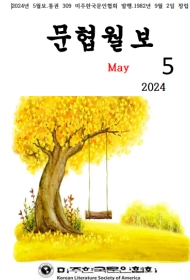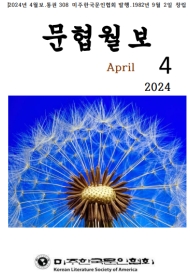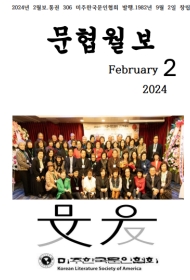A Few Fragmentary Thoughts
2012.08.17 16:57
A Few Fragmentary Thoughts
============================
Wolran Kim
July, 2012
Cultural Capital
===============
Social stratums always take shape in gatherings because all individuals are different and people meet in similar groups. In modern stratification, class is basically not much different from slavery and the caste system. Class, which is determined by capital and meritocracy, is another deformed face with legal compulsion. The wedding announcements of the "Sunday Style" section in NY Times represents exactly what the Capital Culture is. All brides and grooms have evenly graduated from prestigious universities and have distinguished jobs, which classifies them as the category of social leaders. Deservedly we can imagine the background of their parents’ positions, and they have boastful educations and occupations as well. They are the center of the highest level of society, and their enumerated careers are enough to guess their economic strengths and social impact.
There is little support for rigid systems of inequality in modern, industrialized societies, and the remaining caste systems appear to be transitioning into class systems. The boundary layer between stratification which is based on the proletariat and bourgeoisie of Karl Marx and the prestige and power of Max Weber, is high and solid. These marriage announcements are news of the upper class, for the upper class. The working class and lower class have nothing to do with it, and they are not invited. The lifestyles between the white-collar and blue-collar are totally different, such as the difference between the Brahman and Vaisya of the Caste system. Class is not much different from the gap between the white landowners and the black slaves.
A couple weeks ago, there was a news article about an orphan girl who was accepted at Harvard while she lived at school as a janitor. This kind of story is unusual and she was issued because she overcame rugged boundaries of social class. Intergenerational hereditary privileges of economic and social power are a natural result, and they believe that is enough for entitlement.
Maxed Out
===========
These days, there is no one who does not have a few credit cards in their wallet. The average American has six credit cards according to some reports. A credit card is often likened to Janus because its effect varies depending on use, just as the two different faces of Janus, good and evil. There are several advantages but there are also opportunities to give birth to various social problems and confusion like the film, Maxed Out, shows with credit card fraud, criminal activity, and suicides from bankruptcy, family breakdowns, etc. The majority of credit card users pay high fees, more than 20%, while credit card companies ensure continued competition-oriented cash advances. Consequently, customers’ damages are steadily increasing. Credit is namely a debt.
A credit card is as a double-edged sword, and the price of free money would lead to ruining both oneself and one’s family.
The credit card in your wallet is always watching you, and then legally takes away your money whenever you make any mistake in economic activity. A good customer to credit card companies is overdue, advances cash frequently, and never gets any benefits from laziness. Having many credit cards does not mean good credit, but higher possibility of debt. Therefore, the revenue of credit card companies is inversely proportional to the level of ordinary life. Having credit cards is evidence of becoming slaves of capitalism. A crisis to the poor is an opportunity to the rich.
The ecosystem of economy is a cruel reality in a capitalist society. If poor people fail to defend themselves, they become preys of the rich. Someone’s income comes from someone else’s loss such as Zero-Sum games, and the rich are always winning in this game. Poor people do not know about the rich, but rich people know the minds of the poor. The rich earn more money if there are more poor people.
The wealthy come from a sacrifice of the poor, so an explanation of poverty which is caused by structural forces within society is more persuasive in this economy. This is also related to Barbara Ehrenreich’s Nickel & Dimed: “poor people endure privation so that inflation will be low and stock prices high. To be a member of the working poor is to be an anonymous donor, a nameless benefactor, to everyone else.”
Miss Representation Extended Trailer
====================================
Women make up more than half of the world’s population, and 51% are female in the U.S. So, it was surprising to me that the U.S. congress is comprised of just 17% female, compared to Sweden’s 58% and France’s 42%. Also, some thirty-eight countries have had female heads of state, but not the United States because this country is the most progressive one. The role of women is extremely large in the United States where it is the center of the capitalist world, democracy, and egalitarianism. But still, a long political situation of women in traditionally male-dominated politics is still low, and the topics related to women are considered secondary. The ability of women to men has been suppressed worldwide.
This film, Miss Representation Extended Trailer shows us gender inequality, rampant commercialization of women, and the importance of the role of women leaders. I agree with the one young woman who stated, "It's all about the body, not about the brain." In modern capitalist society, the gender and sex of humans are used for advertising, social entertainment, and nightlife ranging from decadent pleasure to purpose. In particular, the sex of women is over-highlighted and exaggerated in an erotic and kinky manner as an object of sexual desire to men.
Commodification of the female is that the character of females is degraded as a means to profit or for a product strategy to make money. The bigger problem is that we are insensible to this trend, and this perception of females exacerbates the problem of commercialization. Also, this issue causes a decline in women's rights and human rights. Modern society is equalized but still remains discriminatory of females all over society. The activities of women leaders in many fields, such as Sarah Palin, Hilary Clinton, Condoleezza Rice, Sonia Sotomayor, Elena Kagan, are inspirations to extend the rights of women.
The feminist slogan of Carol Hanisch, “The most personal is the most political,” criticizes the male-centered social structure that is the dichotomy of the personal and the political. The lives of women have been regulated as individual issues, and this dichotomy of sexual discrimination is extended and adhered in public. Individual efforts should be made to advance the intelligible in order to empower women’s rights.
"Frontline”
==========
The most serious problem in American capitalism is the health care system. The ideology of capitalism is giving equal economic opportunities to all citizens, but no system of basic health care is contrary to economic justice. The biggest problem with American health care is a cost issue in a tough economy and the cumulative fiscal deficit. The United States has developed private health insurance companies and help for low-income people. 15% of the population receives public assistance from Medicaid. 19% of the population, the elderly and disabled, also operate with Medicare and other public insurance beneficiaries.
At least 15% of the population is not guaranteed at all and many of the population does not receive proper medical care. Medical debt is the main reason for bankruptcy. The United States spends much more on individual health care consumption than any other country. They are also a leader in biomedical research, development, and introduction of new products in the world. Medical agencies claim that expensive medical costs are reinvested massively in that research and development. The current debate on health care is all about reform of the system, accessibility, fairness, efficiency, cost, and the right to equality.
The new health care of the Obama government is focused on expanding Medicaid for low-income households and to subsidize health insurance beneficiaries for the middle class. If this process of reform succeeds, about 95% of population gets into the health care system. The ideal health care system is where the whole nation joins compulsory in insurance, pays premiums based on ability, and receives universal health coverage. Establishing a health care system is an urgent need to social stability and integration of concerns for the all different parties, individuals/families, insurance companies, employers, doctors, and hospitals.
============================
Wolran Kim
July, 2012
Cultural Capital
===============
Social stratums always take shape in gatherings because all individuals are different and people meet in similar groups. In modern stratification, class is basically not much different from slavery and the caste system. Class, which is determined by capital and meritocracy, is another deformed face with legal compulsion. The wedding announcements of the "Sunday Style" section in NY Times represents exactly what the Capital Culture is. All brides and grooms have evenly graduated from prestigious universities and have distinguished jobs, which classifies them as the category of social leaders. Deservedly we can imagine the background of their parents’ positions, and they have boastful educations and occupations as well. They are the center of the highest level of society, and their enumerated careers are enough to guess their economic strengths and social impact.
There is little support for rigid systems of inequality in modern, industrialized societies, and the remaining caste systems appear to be transitioning into class systems. The boundary layer between stratification which is based on the proletariat and bourgeoisie of Karl Marx and the prestige and power of Max Weber, is high and solid. These marriage announcements are news of the upper class, for the upper class. The working class and lower class have nothing to do with it, and they are not invited. The lifestyles between the white-collar and blue-collar are totally different, such as the difference between the Brahman and Vaisya of the Caste system. Class is not much different from the gap between the white landowners and the black slaves.
A couple weeks ago, there was a news article about an orphan girl who was accepted at Harvard while she lived at school as a janitor. This kind of story is unusual and she was issued because she overcame rugged boundaries of social class. Intergenerational hereditary privileges of economic and social power are a natural result, and they believe that is enough for entitlement.
Maxed Out
===========
These days, there is no one who does not have a few credit cards in their wallet. The average American has six credit cards according to some reports. A credit card is often likened to Janus because its effect varies depending on use, just as the two different faces of Janus, good and evil. There are several advantages but there are also opportunities to give birth to various social problems and confusion like the film, Maxed Out, shows with credit card fraud, criminal activity, and suicides from bankruptcy, family breakdowns, etc. The majority of credit card users pay high fees, more than 20%, while credit card companies ensure continued competition-oriented cash advances. Consequently, customers’ damages are steadily increasing. Credit is namely a debt.
A credit card is as a double-edged sword, and the price of free money would lead to ruining both oneself and one’s family.
The credit card in your wallet is always watching you, and then legally takes away your money whenever you make any mistake in economic activity. A good customer to credit card companies is overdue, advances cash frequently, and never gets any benefits from laziness. Having many credit cards does not mean good credit, but higher possibility of debt. Therefore, the revenue of credit card companies is inversely proportional to the level of ordinary life. Having credit cards is evidence of becoming slaves of capitalism. A crisis to the poor is an opportunity to the rich.
The ecosystem of economy is a cruel reality in a capitalist society. If poor people fail to defend themselves, they become preys of the rich. Someone’s income comes from someone else’s loss such as Zero-Sum games, and the rich are always winning in this game. Poor people do not know about the rich, but rich people know the minds of the poor. The rich earn more money if there are more poor people.
The wealthy come from a sacrifice of the poor, so an explanation of poverty which is caused by structural forces within society is more persuasive in this economy. This is also related to Barbara Ehrenreich’s Nickel & Dimed: “poor people endure privation so that inflation will be low and stock prices high. To be a member of the working poor is to be an anonymous donor, a nameless benefactor, to everyone else.”
Miss Representation Extended Trailer
====================================
Women make up more than half of the world’s population, and 51% are female in the U.S. So, it was surprising to me that the U.S. congress is comprised of just 17% female, compared to Sweden’s 58% and France’s 42%. Also, some thirty-eight countries have had female heads of state, but not the United States because this country is the most progressive one. The role of women is extremely large in the United States where it is the center of the capitalist world, democracy, and egalitarianism. But still, a long political situation of women in traditionally male-dominated politics is still low, and the topics related to women are considered secondary. The ability of women to men has been suppressed worldwide.
This film, Miss Representation Extended Trailer shows us gender inequality, rampant commercialization of women, and the importance of the role of women leaders. I agree with the one young woman who stated, "It's all about the body, not about the brain." In modern capitalist society, the gender and sex of humans are used for advertising, social entertainment, and nightlife ranging from decadent pleasure to purpose. In particular, the sex of women is over-highlighted and exaggerated in an erotic and kinky manner as an object of sexual desire to men.
Commodification of the female is that the character of females is degraded as a means to profit or for a product strategy to make money. The bigger problem is that we are insensible to this trend, and this perception of females exacerbates the problem of commercialization. Also, this issue causes a decline in women's rights and human rights. Modern society is equalized but still remains discriminatory of females all over society. The activities of women leaders in many fields, such as Sarah Palin, Hilary Clinton, Condoleezza Rice, Sonia Sotomayor, Elena Kagan, are inspirations to extend the rights of women.
The feminist slogan of Carol Hanisch, “The most personal is the most political,” criticizes the male-centered social structure that is the dichotomy of the personal and the political. The lives of women have been regulated as individual issues, and this dichotomy of sexual discrimination is extended and adhered in public. Individual efforts should be made to advance the intelligible in order to empower women’s rights.
"Frontline”
==========
The most serious problem in American capitalism is the health care system. The ideology of capitalism is giving equal economic opportunities to all citizens, but no system of basic health care is contrary to economic justice. The biggest problem with American health care is a cost issue in a tough economy and the cumulative fiscal deficit. The United States has developed private health insurance companies and help for low-income people. 15% of the population receives public assistance from Medicaid. 19% of the population, the elderly and disabled, also operate with Medicare and other public insurance beneficiaries.
At least 15% of the population is not guaranteed at all and many of the population does not receive proper medical care. Medical debt is the main reason for bankruptcy. The United States spends much more on individual health care consumption than any other country. They are also a leader in biomedical research, development, and introduction of new products in the world. Medical agencies claim that expensive medical costs are reinvested massively in that research and development. The current debate on health care is all about reform of the system, accessibility, fairness, efficiency, cost, and the right to equality.
The new health care of the Obama government is focused on expanding Medicaid for low-income households and to subsidize health insurance beneficiaries for the middle class. If this process of reform succeeds, about 95% of population gets into the health care system. The ideal health care system is where the whole nation joins compulsory in insurance, pays premiums based on ability, and receives universal health coverage. Establishing a health care system is an urgent need to social stability and integration of concerns for the all different parties, individuals/families, insurance companies, employers, doctors, and hospitals.
댓글 0
| 번호 | 제목 | 글쓴이 | 날짜 | 조회 수 |
|---|---|---|---|---|
| 10559 | 잠 속에서도 자란다 | 오연희 | 2012.08.12 | 0 |
| 10558 | 파도 나의 바다는 | 박영숙 | 2008.08.19 | 0 |
| 10557 | 그리움이여! | 박영숙 | 2008.08.19 | 0 |
| 10556 | 물 한 방울 떨어지면 | 박영숙 | 2008.08.19 | 0 |
| » | A Few Fragmentary Thoughts | 이월란 | 2012.08.17 | 0 |
| 10554 | “Farmingville” | 이월란 | 2012.08.17 | 0 |
| 10553 | Why Joe Became a Criminal? | 이월란 | 2012.08.17 | 0 |
| 10552 | “Savage Inequalities” | 이월란 | 2012.08.17 | 0 |
| 10551 | 수진아, 수진아 (제 2 회) | 김영문 | 2012.08.08 | 0 |
| 10550 | 다르다와 틀리다 | 김학천 | 2012.08.08 | 0 |
| 10549 | 가족 / 석정희 | 석정희 | 2012.08.08 | 0 |
| 10548 | 물 | 정용진 | 2012.08.09 | 0 |
| 10547 | 향기 퍼 올리는 3월 | 강민경 | 2012.08.09 | 0 |
| 10546 | 공공 수영장의 백인 미녀 | 오연희 | 2012.08.10 | 0 |
| 10545 | 사은회에 부치는 글 | 노기제 | 2012.07.19 | 0 |
| 10544 | 옛날 짜장면 | 서용덕 | 2012.07.22 | 0 |
| 10543 | 잠이 안 와요 | 이상태 | 2012.07.22 | 0 |
| 10542 | , 는개 그치네 | 강민경 | 2009.08.20 | 0 |
| 10541 | 오독(誤讀) | 이월란 | 2008.12.10 | 0 |
| 10540 | 끈을 놓을 때 | 노기제 | 2012.09.11 | 0 |












